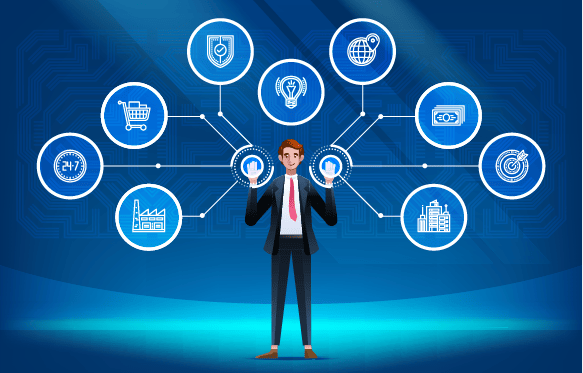With large-scale digitalization, it’s safe to say that AI is becoming an indispensable part of our everyday life. A prominent example of the same could be, recommendations. If you are into buying e-books on Amazon, you’ll notice you get suggestions based on your recent purchases, or you might’ve noticed how Netflix recommends shows based on your recent watch list.
But, how exactly do they do it? The answer is, the algorithms responsible for these suggestions are designed in a way to process a humongous amount of data. When combined with your recent searches/purchases/watches, it suggests the most relevant result to you! This way, AI takes the customer experience to the next level!
AI technology is revolutionizing every industry, and the retail sector is no different. With excessive moderation made through predictive analysis and AI, a data-driven approach has been adopted by the retail industry. This high-level data-inflow into operations is empowering the existing retail businesses with substantial business opportunities. In fact, as per a report by Statista, the market for AI in the retail segment is predicted to grow exponentially and reach around $31.18 billion by the year 2028.
In this, blog we’ve shortlisted the top 9 ways through which AI is transforming the retail industry both from a customer and a retailer’s point of view!
Sounds interesting? Let’s dive straight into the blog!
9 Ways AI Is Transforming the Retail Segment

1. Chat Bots
AI in retail is transforming the segment with chatbots. These chat programs are designed to encourage customer service and give a boost to customer engagement. There’s no doubt that answering repetitive consumer queries can be exhausting for us. With AI-enabled chatbots, your business can engage with your customers anytime, while you focus on other important aspects. These chatbots are programmed in a way to answer the commonly asked questions of users and direct them towards relevant, meaningful answers. In case, they’re unable to resolve the queries, they suggest the appropriate way of action for getting personalized customer support. Not only this, chatbots can offer customer engagement and personalized services as they feed onto customer data over time.

2. Micro-Segmentation
It’s no hidden secret that AI algorithms are capable of churning huge chunks of data and offering viable proportions that can help in decision-making. While processing such humongous data, AI draws upon patterns of similar behavior of customers. Later, it groups customer profiles with alike features and thereby creates micro-segments. As mentioned earlier, each segment has something in common, be it low frequency to your store but higher spending or vice versa. With this data at hand, retailers can customize their marketing strategies to create a win-win situation for both parties.

3. Cashier-Free Shopping Experience
It’s 2023 and cashier-free shopping is gaining a lot of popularity, all thanks to AI. Let’s admit, nobody likes to stand in long check-out queues at stores, right? Retailers across the globe have recognized this problem and are willing to speed up the checkout process with AI technology. The most prominent example of the same could be, Amazon Stores. In these retail stores, customers can check in, grab what they want and walk out! The AI technology, adds what the customer is buying to their Amazon account and at the time of checkout charges them for the same! This saves time for the customers and allows them to have an enjoyable shopping experience. This way, AI allows retailers to cut costs and automate tasks without compromising on the customer experience.

4. Loss Prevention
With self-checkout technologies, the menace of shoplifting can increase. However, AI steps in here and flags any suspicious activity on the part of the customer, happening in real time. Such technology is incorporated into video systems and scanners used during checkout. This brings in the question of customer privacy. While a reputable retail security system attempts to secure business assets without compromising customer’s privacy, you can always design the process in a way that ensures only an identified shoplifter’s data gets recorded.

5. Demand Prediction
With AI, predicting customers, as well as market demand, becomes easier than ever. How? Let’s see! Based on your customer’s past behavior, AI can make predictions about their future course of action. With this data at hand, you can create, specific outbound marketing strategies for every segment of customers. Further, retailers can find which areas of their store perform already well and which need further work. Accordingly, they channelize their resources to meet the customer’s needs. For online stores, AI can offer in-depth knowledge about website visitors, customer demography, retention time, the popular time of purchase, and more. This data can help leaps and bounds to retailers for creating targeted marketing strategies for their business.

6. Visual Search Made Easier
AI enables retailers to combine its algorithmic potential with the real-life browsing journey of customers to redefine the latter’s shopping experience. The process involves optimizing real-life browsing patterns with advanced image searches to speed up customers’ buying journeys. These image searches help the customers find the product they’re looking for in no time (instead of browsing through your entire store). Not only this, but image searches also allow customers to find products that are close substitutes for what is in the picture!

7. Emotional Response of Customers
Another boon that AI brings into retail is monitoring the emotional response of customers. The system analyses the biometrics, facial expressions, and audio cues to understand the user’s emotions while encountering a particular product. Later, this data can be optimized to offer product recommendations to customers.

8. Supply Chain Optimisation
AI can also help your store maintain a steady supply of products. How? Let’s see! Based on your customer’s past behavior, AI can predict when you’ll be running out of stock. For instance, during Diwali, a certain sweet from your shop finds a lot of popularity among buyers. With AI, you can analyze your past sales, and raise the bar for the present to ensure that no person has to go to your competitor for that sweet. Further, AI can also help you determine which products are demanded more during a specific period of time. It could be chocolates for Christmas, mangoes and mango products in summer, or any other thing. This allows you to stock up on your potential supplies without scrambling at the last minute when customers start pouring in to inquire about those seasonal products.

9. Facilitates R&D
Last but least, AI in retail can facilitate research and development. The algorithmic technology of AI is put to use by retailers for collecting customer feedback as well as purchase information. This data can be used to create specific products or enhance them to meet your customer’s expectations. In short, AI is bringing about a transformation in the retail industry, both from a buyer's and seller’s perspective. In the years to come, the integration of AI technology in retail will continue to expand and create new opportunities for all.

